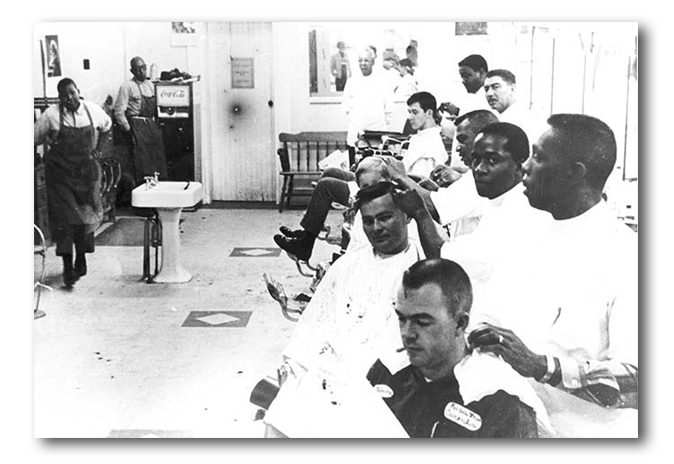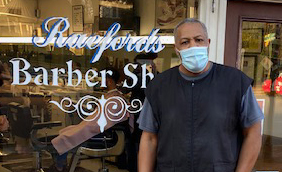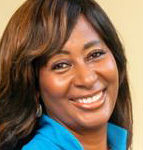
Barbers from front to back: Joe McLain, James Raeford, William Colson, unknown, Sam Reid.
Ralph Johnson is in back in front of the mirror.
FOUNDING FAMILIES | By Tonya Rivens. From blockbuster movies to successful entrepreneurs, Black barber shops are a critical part of the African American story nationwide, as well as Cornelius.
For decades here and elsewhere, Black-owned barber shops only served white customers.
It was all about race since Black barbers were not allowed to use the same tools for Black customers. Davidson College students boycotted barber Ralph Johnson, who was Black, during the summer of 1968 after he refused to cut two Black men’s hair. The students’ boycott and protests forced Johnson to eventually accept Black customers.
In his autobiography, “David Played a Harp,” Johnson said “they had made me a scapegoat for their own offenses against Black mankind. I was at the same time the victim of their age-old wrongs and now the object of their wrath because they had done these wrongs.”
Johnson closed his business in 1971.
Raeford’s

Ron Raeford
Ken Norton, the other Black barber in town, had a shop about four doors from Johnson and also refused Black customers. However, his business was never boycotted. When Norton closed his business in September 1993, James Raeford, who had worked with Ralph Johnson, opened his barber shop on Main Street, Davidson in October of that same year.
In an interview that I conducted with Raeford several years ago, he shared that he threatened to quit his job at Johnson’s barber shop if he didn’t accept Black customers because it was time for a change. Raeford also shared that Johnson lost a few white customers when the barbershop started accepting Black clients however they eventually returned.
Today, Ron Raeford continues his father’s legacy.
The clientele at Raeford’s, the only Black-owned barbershop in Davidson, is 90 percent white and 10 percent black. Raeford attributes this to Davidson College Black students not knowing that his business can provide the services they need and that some students may be uncomfortable sitting in the barber shop with their instructors.
Potts
He said some African Americans who are natives of Davidson may prefer Potts Barber Shop in Cornelius or neighborhood barbers.
On the day that I visited, a former Davidson College student—who was white—was getting a haircut. He said a white recommended the barber shop to him when he was a student. The reason: Raeford’s provided a better understanding of how African Americans are treated.
As for Potts Barber Shop in Cornelius, the whites-only shop started accepting Black clients about the same time as the boycott of Johnson’s place in Davidson.
According to Gerald “Mickey” Potts, Eddie Burton, a Black man from the Smithville community, walked in the shop and Wilson told Burton to take a seat, no muss, no fuss, back when things like this were not done.
It was local history in the making.
Mickey, who has been a barber for 65 years, said they lost only one white patron as a result of cutting Burton’s hair.
Today, the clientele at Potts Barbershop is about 80 percent black; 20 percent white.
Rivens
I interviewed Lem Bell, a white man, to discuss the desegregation of barber shops in Cornelius.
Bell shared that my grandfather Ausie Rivens, who was an unlicensed barber prior to the boycott in Davidson, cut the hair of black and white customers in his front yard.
According to Bell, race was not a factor when getting a haircut there. Rivens eventually got his license and opened a shop where James Raeford trained as an apprentice. The neighborhood barber in Cornelius during this time was Quincy Tucker.
Black barbers in Any Town, USA, will tell you that their profession is more than a cut and shave; it’s also a rite of passage. They provide advice, share life experiences and consider their customers to be family. Black barbers helped improve race relations one cut at a time.

Tonya Rivens
Tonya Rivens is a multi-skilled journalist in radio and television and is currently heard on Streetz 103.3/100.5 FM, blogs at tonyarivens.com.





